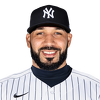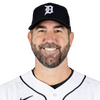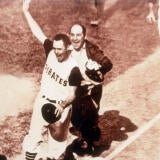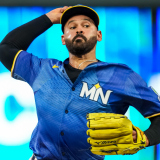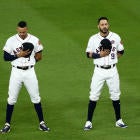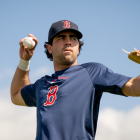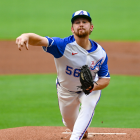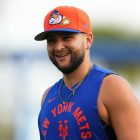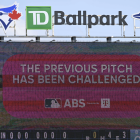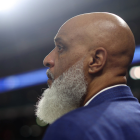
World Series 2017: How the AL champion Houston Astros built their roster
Surprisingly few current Astros were originally drafted by the team
For the first time, the Houston Astros are American League champions. They are the first team in history to represent both the AL and NL in the World Series. The 'Stros went to the Fall Classic in 2005 as a member of the Senior Circuit. This season, the Astros outlasted the Yankees in seven games in the ALCS to advance to the World Series against the Los Angeles Dodgers. Houston is four wins away from the franchise's first championship. Game 1 is Tuesday.
Like every team, the Astros were assembled through all sorts of different methods. Teams need to acquire talent through every avenue, from the draft, trade market or free agency. The Astros have done exactly that, and they were patient during a long rebuild. Let's look at how the 2017 Astros were built.
The Draft
The perfect scenario for every team is building a homegrown core through the amateur draft, then supplementing that group with trades and free-agent signings. The Astros have done that, drafting six of the 25 players on their ALCS roster.
The Astros had the No. 1 pick in three straight drafts from 2012-14, and all three have helped them get to the World Series, though only one of them is still in the organization. In 2014, Houston used the top pick on high school southpaw Brady Aiken, who agreed in principle to a $6.5 million bonus. The team found something they didn't like in his elbow during his pre-signing physical, however, and offered a reduced $5 million bonus. Aiken rejected it and did not sign.
As compensation for failing to sign the top pick, the Astros received the No. 2 selection in 2015. They used that pick on LSU shortstop Alex Bregman, who is now their starting third baseman. Bregman had a good first half (.256/.338/.419) and a great second half (.315/.367/.536) in 2017, his first full season as a big leaguer. Aiken, meanwhile, had Tommy John surgery in the spring of 2015 and was selected 17th overall by the Indians in that year's draft. He received a $2.5 million bonus but hasn't regained his previous stuff following elbow reconstruction.
The first of those three straight No. 1 picks was used on Carlos Correa, a high schooler out of Puerto Rico. Correa was not the consensus No. 1 prospect in the 2012 draft. That happened to be current Twins center fielder Byron Buxton. The Astros, in their first draft under general manager Jeff Luhnow, opted to select Correa with the No. 1 pick over Buxton because Correa was willing to take a below-slot bonus, allowing them to use the bonus pool savings elsewhere.
Despite the pre-draft rankings, Correa quickly emerged as the best prospect in baseball and made his MLB debut in June 2015. He was named AL Rookie of the Year as a 20-year-old that season and is already a bona fide MVP candidate at age 22.
Under Luhnow, the Astros have done a swell job of hoarding draft picks by acquiring competitive balance lottery picks from other clubs via trade. Those competitive balance picks are the only tradeable picks in the draft. Houston acquired the 37th overall selection in the 2014 draft from the Orioles in the Bud Norris trade back in 2013, and they used that pick on University of Virginia product Derek Fisher. Fisher made his MLB debut this season and was on both the ALDS and ALCS rosters as an extra bench bat.
Dallas Keuchel is very much a player -- and personal -- developmental success story. He was a solid three-year starter at Arkansas who wasn't a highly rated prospect in 2009 because he was a finesse guy who would get his fastball to 87-88 on his best days. He's since developed into a true frontline starter thanks to his work ethic and pitching aptitude. Houston's throwing program helped him add some velocity and his secondary pitches have improved across the board as a pro. The Astros deserve a lot of credit for identifying Keuchel as a mid-round gem, but more importantly, Keuchel deserves credit for making himself into the player he is today. He's worked hard. He didn't coast on talent.
Remember when I said the Astros selected Correa first overall in part because he'd take a below-slot bonus and allowed them to spend the savings elsewhere? That money went to Lance McCullers. At one point he was considered the top high school pitching prospect in the 2012 draft class, though big bonus demands -- McCullers was said to be seeking $4 million -- and a strong commitment to Florida caused him to slip into the supplemental 1st round. The Astros convinced him to turn pro with a $2.5 million bonus. McCullers has had some injury issues as a pro, but he's always been excellent when healthy, and he recorded a four-inning save in Game 7 of the ALCS.
It's not often you see a player like George Springer in the college ranks, especially from a cold weather state. Springer starred at UConn and obviously had the tools. He could hit, run, throw, and do everything there is to do on baseball field. Athletes like that tend to find themselves at a powerhouse college program in the warm weather state, or drafted high out of high school. Springer did come with some swing-and-miss concerns, though he's overcome those to become a truly outstanding five-tool player who impacts the game in every single way. Springer was the final 1st round pick selected by former GM Ed Wade, who was fired following the 2011 season and replaced by Luhnow.
Trades
Similar to the Dodgers, the Astros acquired more players on their ALCS roster through trades than by any other means. In several instances Houston did a wonderful job identifying unheralded prospects in another organization, then acquiring and developing them into productive big leaguers. Nine players on the ALCS roster were originally acquired via trades.
From player to be named later to All-Star. The Astros acquired Chris Devenski from the White Sox to complete the Brett Myers trade way back in 2012. The Chicago White Sox received Myers with prospects Matt Heidenreich and Blair Walters going the other way. And a player to be named later -- Devenski. He was never a top prospect -- Baseball America never ranked Devenski among Houston's top 30 -- but an elite changeup and a bulldog mentality has turned Devenski into one of the top setup relievers in the game.
The path Evan Gattis took to the World Series is a very unique one. He quit baseball in college and spent several years traveling the country, which included stints in a psychiatric ward and as a janitor. Gattis returned to college in 2010, mashed the ever-loving crap out of the ball for a year -- he hit .403/.519/.712 at the University of Texas of the Permian Basin his draft year -- then was drafted in the 23rd round by the Braves. They eventually traded Gattis, as well as reliever James Hoyt, to the Astros for prospects Mike Foltynewicz, Rio Ruiz, and Andrew Thurman.
Like I said earlier, the Astros held the No. 1 pick in three straight drafts from 2012-14. They used one on Correa, and another on Aiken, who didn't sign and gave the team the compensation pick they used on Bregman. The other No. 1 pick was used on Mark Appel in 2013. Appel was lights out in his four years at Stanford, though after two years in the minors, it was clear his development was not going as planned. That's when the Astros sent him to the Phillies for Ken Giles. The full trade:
- Astros get: Giles, Jonathan Arauz
- Phillies get: Appel, Vince Velasquez, Brett Oberholtzer, Thomas Eshelman, Harold Arauz
No, the two Arauzes are not related. Anyway, the Astros missed out on some great players by taking Appel -- among those selected in the 1st round that year: Kris Bryant (2nd overall), Jon Gray (3rd overall), and Aaron Judge (32nd overall) -- though they did well to trade him for Giles, their closer and best reliever. That's how you salvage a bad selection. Credit the Astros for not stubbornly holding on to Appel and hoping he would turn it around.
Appel, by the way, has yet to reach the big leagues. He is now 26 and has a career 5.06 ERA in 375 1/3 minor league innings. That includes a 5.27 ERA in 82 Triple-A innings in 2017. Imagine if the Astros had Bryant in their lineup, too? Oy vey.
In one of his first moves as general manager, Luhnow acquired Marwin Gonzalez from the Red Sox in a prearranged deal during the 2011 Rule 5 Draft. The Astros wanted to take multiple players in the Rule 5 Draft -- they used the No. 1 pick on righty Rhiner Cruz -- so they worked out a trade with Boston. The Red Sox selected Gonzalez from the Cubs, then immediately traded him to the Astros for minor leaguer Marco Duarte.
Per the Rule 5 Draft rules, Gonzalez had to remain on Houston's active 25-man roster during the entire 2012 season. They stuck with him and dealt with the growing pains, and this year they were rewarded with a monster breakout season. Gonzalez hit .303/.377/.530 with 23 home runs in 2017 while playing every position other than pitcher, catcher, and center field. For all intents and purposes, Gonzalez was a Rule 5 Draft selection. Either way, he's become a key contributor for the AL champs.
The Astros made only one trade at this summer's trade deadline -- you may recall Keuchel saying that was disappointing -- and that was acquiring Francisco Liriano from the Blue Jays for outfield prospect Teoscar Hernandez and outfield veteran Norichika Aoki. Liriano allowed nine runs in 14 1/3 regular season innings after the trade, all in relief. He's allowed one run in 1 2/3 postseason innings so far. Liriano will become a free agent after the season, so he's a rental.
Not only did the Astros acquire Brian McCann from the Yankees, the team they beat in the ALCS, they also got to watch him deliver big hits against his former team in Games 6 and 7. And the Yankees are paying part of his salary as well ($5.5 million of $17 million) Houston wanted a veteran leader and strong defender behind the plate, so when Gary Sanchez made McCann expendable in New York, the Astros pounced. Pitching prospects Albert Abreu and Jorge Guzman went the other way.
During Luhnow's first summer as general manager, he worked to unload as many veterans as possible in an effort to add talent. He swung a massive nine-player trade with the Blue Jays prior to the 2012 trade deadline that brought Musgrove to Houston. The trade details:
- Astros get: Musgrove, Francisco Cordero, Ben Francisco, Carlos Perez, David Rollins, Asher Wojciechowski, Kevin Comer
- Blue Jays get: J.A. Happ, David Carpenter, Brandon Lyon
Toronto selected Musgrove with the 46th overall pick in the 2011 draft and paid him a $500,000 bonus, then traded him roughly a year later. He was the headliner for the Astros, along with Wojciechowski and Comer, who were also recent high draft picks. Musgrove made his MLB debut last season and has struggled a bit as a starter, but he really thrived in relief in the second half this past season.
It took a little longer than the Astros probably hoped, but Brad Peacock finally settled as a solid contributor in 2017, throwing 132 innings with a 3.00 ERA in 21 starts and 13 relief appearances. He came over from the Athletics along with Chris Carter and Max Stassi during the 2013-14 offseason. Jed Lowrie and Fernando Rodriguez went the other way. That was the first time the 'Stros traded Lowrie to the A's. Also, Peacock was originally drafted by the Nationals. They sent him to Oakland as part of the Gio Gonzalez trade.
Even though this trade didn't happen until minutes prior to the deadline for teams to acquire players and have them be eligible for the postseason roster, this was the most impactful move for the 2017 deadline. The Astros, after hearing Keuchel (and others) say they were disappointed at their lack of activity, went all-in and acquired Justin Verlander from the Tigers for prospects Franklin Perez, Daz Cameron, and Jake Rogers. Houston also received a player to be named later in the deal.
Verlander was marvelous during the regular season (1.06 ERA in five starts), though the Astros didn't acquire him for that purpose. They got him for the postseason and to help win the World Series. Verlander has a 1.46 ERA in 24 2/3 innings in the playoffs and was just named ALCS MVP after throwing 16 innings of one-run ball against the Yankees. It's worth noting the Astros have Verlander for two more seasons at $20 million annually, so this was not a rental. What an impact trade.
Free Agent Signings
Even while rebuilding, the Astros were not shy about spending on major league free agents. They didn't hand out any large payroll busting contracts, but they signed several established veterans to help lead the young players along the way. Five players on Houston's ALCS roster were originally signed as free agents.
The Astros scooped up Juan Centeno as a depth catcher last offseason, and while he spent most of the season in Triple-A, he has been on the postseason roster as a third catcher in case the club gets aggressive with pinch-runners or pinch-hitters in a close game. Centeno is a classic catch-and-throw guy who doesn't offer much at the plate.
When the Astros sought to add veteran leadership and lineup depth this past offseason, they targeted two former Yankees: McCann and Carlos Beltran. Beltran is, of course, a former Astro as well, having been part of the team's 2004 postseason run, during which he hit eight home runs in 12 games. This was a tough year for Beltran at the plate (.231/.283/.383), though he still provides a Grade-A clubhouse presence, and now he has a chance to win that elusive World Series ring at age 40.
Luke Gregerson was one of the first free agents the Astros signed when they started to make the transition from rebuilder to contender. He's done basically everything during his three-year contract -- close, set up, mop up, middle relieve. Gregerson is more of a low-leverage option these days, but he had a hand in getting the Astros to where they are right now.
The starting pitching hero of Game 7 joined the Astros on a two-year contract last offseason despite making only four April starts in 2016. A severe hamstring injury sabotaged Charlie Morton's season a year ago, but the 'Stros loved his stuff and competitiveness, so they gave him two guaranteed years, and he rewarded them with a strong regular season and a fantastic performance in the ALCS clincher.
The Astros were very aggressive this past offseason, adding four veteran players before Christmas. Josh Reddick joined Morton, Beltran, and McCann as the new additions with a big four-year contract. Reddick had a fantastic regular season, hitting .314/.363/.484 overall and fitting the club's contact-and-power approach. He also brought excellent right field defense to the table. No, Reddick did not have a particularly good ALCS, but his team won anyway. He was a sneaky good offseason signing and a big time contributor during the regular season.
International Free Agency
While the draft gets all the attention, international free agency is another way for teams to add amateur talent. So many of the game's top players originally signed as international amateurs, including the 2017 AL MVP favorite.
Not surprisingly, Jose Altuve's small stature worked against him as an amateur. In fact, the Astros originally cut him from a tryout camp in his native Venezuela back in 2007. He went back for a second tryout a few weeks later, at which point the team offered a $15,000 bonus. Altuve was never a top prospect -- he topped out at No. 28 on Baseball America's top 30 Astros prospects list -- and he was doubted for years and years because of his size. Now he is on the very short list (no pun intended) of the best players in baseball, the AL MVP front-runner, and an American League champion.
For the longest time it seemed Yuli Gurriel would never make it to MLB. He was the best player in Cuba for more than a decade -- in his final season in Cuba, he hit .500/.589/.874 with 38 walks and three strikeouts in 49 games -- but he never showed much desire to defect. He finally did defect last year, along with his brother Lourdes Gurriel, a Blue Jays prospect. Soon thereafter the Astros gave him a guaranteed five-year major league contract. Gurriel hasn't replicated his Cuban numbers in MLB -- that would've been an absurd expectation -- though he has been extremely productive, and has been perhaps the team's most consistent hitter this postseason.
Waivers
Not every player on a postseason roster was a high-profile acquisition. Some are picked up in easy-to-overlook moves and turn into key contributors. Three players on Houston's ALCS roster -- three! -- were claimed on waivers. Their former teams just gave them up for nothing.
There was surprise throughout baseball when the Diamondbacks put Will Harris on waivers during the 2014-15 offseason. He had a 3.42 ERA in 81 2/3 innings for Arizona from 2013-14, so he was a serviceable young reliever, yet they just gave him away. The 'Stros claimed him and now Harris is a very good setup reliever with an All-Star Game selection to his credit. And Houston got him for nothing. Just the $50,000 waiver fee.
There are different types of waivers in baseball. Harris was claimed on outright waivers, meaning the D-Backs were trying to drop him from the 40-man roster. Cameron Maybin, meanwhile, was claimed on trade waivers from the Angels. Los Angeles could've pulled him back and kept him, or negotiated a trade with the Astros. Instead, they awarded Maybin to the Astros on the claim, effectively salary dumping him. The Angels saved about $1.5 million, though they were in the postseason race at the time, and probably could've used him given their left field mess. Instead, Maybin is going to the World Series with the Astros as their speed-and-defense reserve outfielder.
Turning a waiver claim into a cheap and dependable MLB starter is quite the trick. The Astros claimed Collin McHugh because they loved his spin rates -- this was before spin rates really became a thing -- and he's since given them 606 1/3 innings with a 3.70 ERA. An elbow injury threw a wrench into his 2017 season, but McHugh was on the ALCS roster, and he tossed four scoreless and hitless innings in relief in the Game 3 blowout loss, sparing the rest of the bullpen.
Other Notables
It takes a village to get to the postseason these days. Teams need way more than 25 players to win the World Series, and the deepest organizations are often the ones left standing in late October. Here are several Astros players who chipped in during the regular season, but are not on the postseason roster.
Yet another former Yankee. Tyler Clippard started the season in New York, was shipped to the White Sox in the trade that sent David Robertson, Tommy Kahnle, and Todd Frazier to the Yankees, then was flipped to the Astros a few weeks later for cash. Clippard struggled all year, throwing 60 1/3 innings with a 4.77 ERA. That includes allowing 10 runs in 14 innings with Houston, which is why he is not on the postseason roster despite his track record.
Back in 2010, Michael Feliz originally signed with the Athletics as an international free agent for $800,000. That deal was voided after he tested positive for a banned substance. The Astros signed him a few weeks later for $400,000 and helped him develop into a very good prospect. Feliz has spent the last three seasons doing up and down, and he is not on the postseason roster after missing much of 2017 with a shoulder problem.
Believe it or not, Mike Fiers led the Astros with 153 1/3 innings pitched in 2017. He is not on the postseason roster, however, because he had a 5.22 ERA in those 153 1/3 innings. Fiers came over from the Brewers is a big trade deadline deal in 2015. The trade details:
- Astros get: Fiers, Carlos Gomez
- Brewers get: Josh Hader, Adrian Houser, Brett Phillips, Domingo Santana
Fiers has been serviceable and the Astros are going to the World Series, sure, but Luhnow is going to have to take the L for this one. Gomez didn't hit a lick in Houston while Hader and Santana are already important pieces for Milwaukee, and Phillips is poised to join them in 2018. You win some and you lose some.
Hoyt came over from the Braves in the Gattis trade and he's spent the last two years as a depth reliever. He threw 49 1/3 innings with a 4.38 ERA and 66 strikeouts in 2017.
Even though he is only 26, Jake Marisnick has already been part of two high-profile trades that involved a total of 15 different players. He went from the Blue Jays to the Marlins in the big Jose Reyes/Mark Buehrle deal, then from the Marlins to the Astros in the Jarred Cosart trade. The details:
- Astros get: Marisnick, Francis Martes, Colin Moran, competitive balance pick
- Marlins get: Cosart, Enrique Hernandez, Austin Wates
Marisnick has settled in as a defense-first platoon bat, though he did hit a stout .243/.319/.496 with 16 home runs in part-time player in 2017. He is not on the postseason roster due to a thumb injury.
Martes came over from the Marlins in the trade with Marisnick, and at the time, he was an 18-year-old kid in rookie ball. Houston scouts other organizations very well, and after getting him essentially as a throw-in in the trade, they've been able to develop him into a top flight pitching prospect. Martes made his MLB debut this season and did make four starts, though he spent most of the summer working in mop-up duty.
Once upon a time I thought Tony Sipp was going to be a bargain free agent who would make a team look very smart. The Astros re-signed him to a three-year deal worth $18 million during the 2015-16 offseason, and he's rewarded the team with a 5.33 ERA in 81 innings since. Shows what I know. Sipp originally joined the Astros in May 2014, after he exercised an opt-out clause in his minor league contract with the Padres.














